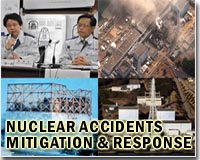 |
Moscow (AFP) March 19, 2011 From seeding clouds to reviving agricultural land, Moscow's experience after Chernobyl can be used by Japan as it tries to contain damage from its quake-hit nuclear plant, Russian experts said. Concerns have grown over the unraveling crisis at the Fukushima power station as Japan struggles to cool down nuclear fuel rods after cooling systems were knocked out by the devastating earthquake and tsunami. While the scope of the catastrophe is not likely to reach the levels of the 1986 Chernobyl disaster under the Soviet Union, Russian experts said Japan could minimize damage by using its experience like seeding clouds and recultivating agricultural land. "The experience of Chernobyl should be used," said Alexey Yablokov, a radiobiology expert and former environmental advisor to Russia's first president Boris Yeltsin. In the immediate aftermath of the accident, it is important that Japan and neighbouring countries control the spread of radioactive materials accumulated in the clouds and ensure that they do not fall over large cities, he said. Consequences for Moscow and other large industrial cities in central Russia could have been much more serious if the Soviet government had not carried out cloud-seeding, the process of artificially altering clouds to change the weather. "It was a secret programme, and ethically it is questionable -- Moscow was saved from radioactive rains at the expense of smaller cities," said Yablokov. Clouds on the way to the capital were seeded with various chemicals and fell on the outlying regions of Tula, Ryazan and Kaluga instead. Clouds bearing radionuclides from Fukushima could be forced to precipitate over the Pacific Ocean before they reached cities such as Russia's Vladivostok, which is home to about 600,000 people. The weather control practice is frequently used by Moscow to guarantee clear skies. Former city mayor Yury Luzhkov was criticized for causing rain in the neighbouring regions on days of celebrations in the capital, such as World War II Victory Day parades. "There should be planes ready with a load of re-agents like silver iodide. One can even use cement" in order to make rain fall over the ocean instead of large cities where it would cause an enormous health hazard, said Yablokov. While Fukushima's reactor type is not likely to spew as much radioactive material as Chernobyl -- where burning graphite caused it to go up several kilometers and fall out over an extensive area -- other factors like nuclear fuel containing plutonium pose new risks, experts said. Reactor 3 in Fukushima is believed to contain such fuel, known as MOX fuel. "Plutonium is 150 times more dangerous" than regular nuclear fuel, said Vladimir Chuprov, an energy expert at Greenpeace Russia, "it's a devil that we're encountering for the first time." Russia, Ukraine, and Belarus have developed methods for recultivating soil with various radioactive levels and know the type of fertilizers and plants that reduce radiation, experts said. "Much of the land was taken out of agricultural use," Chuprov said, "the defence mechanisms there are already well-tested." Lack of information about the amount of fuel inside the reactors, its make-up, and how much of it has escaped is the main problem stopping experts from giving accurate prognoses and mapping the fallout, experts said. "Analysis of fallout from Chernobyl showed that it is spot-like, with some spots more contaminated than others," said Alexander Kislov, a meteorology expert from Moscow State University. "Since Chernobyl we can better understand the geometry of these spots," he said, "but to calculate fallout one needs to know the amount of output from the source, and this data is not being provided by Japan in the required amounts."
Share This Article With Planet Earth
Related Links Bringing Order To A World Of Disasters A world of storm and tempest When the Earth Quakes
 Disaster-hit Japan hopes to cool reactors soon
Disaster-hit Japan hopes to cool reactors soonKitakami, Japan (AFP) March 19, 2011 Japanese engineers fighting to cool overheating reactors laid a power line into a stricken nuclear power plant on Saturday as hundreds of thousands of quake-tsunami survivors endured desperate conditions in the frozen north. In an updated toll, national police said at least 18,000 were dead or missing in Japan's worst natural disaster in 88 years. Just under 7,200 were confirmed killed, lost ... read more |
|
| The content herein, unless otherwise known to be public domain, are Copyright 1995-2010 - SpaceDaily. AFP and UPI Wire Stories are copyright Agence France-Presse and United Press International. ESA Portal Reports are copyright European Space Agency. All NASA sourced material is public domain. Additional copyrights may apply in whole or part to other bona fide parties. Advertising does not imply endorsement,agreement or approval of any opinions, statements or information provided by SpaceDaily on any Web page published or hosted by SpaceDaily. Privacy Statement |